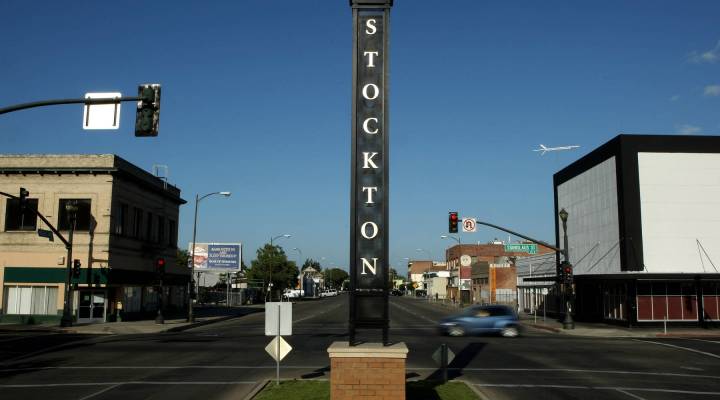
Stockton: Largest U.S. city to declare bankruptcy

Tess Vigeland: Today is a day that will live in the history books of Stockton, Calif., population 292,000. It is now the latest — and largest — U.S. city to declare bankruptcy. Under a budget approved by the city council last night, it will default on more than $10 million in debt payments. Stockton sits in the middle of what’s often called America’s salad bowl, California’s Central Valley, about 80 miles east of San Francisco. The city was an index case for the housing crisis.
Kathy Miller is the vice mayor and joins us now to talk about what this means. Thank you.
Kathy Miller: Thank you.
Vigeland: How long have you lived in Stockton?
Miller: About 15 years.
Vigeland: OK. So you’ve been there for quite a while. I know that this bankruptcy news has been coming, so it’s not exactly unexpected. But what’s the sense there today now that it’s happening?
Miller: Well, it’s kind of twofold. I think for the public, there’s still a lot of fear of the unknown. For the folks primarily in the business community, I think there’s a little bit of feeling of relief that now we’ve taken this step, we can get down to business of recovery.
Vigeland: Who will be feeling the brunt of most of this?
Miller: Well at this point, I think the brunt of who’s going to be contributing to the solution now are bond holders and our retirees.
Vigeland: And what does it mean for them?
Miller: For retirees, the council made the decision that it was more important to protect the pensions of all. So those retirees who have been receiving free lifetime medical benefits for themselves and spouse will now have to pay for that benefit.
Vigeland: What about just basically the citizens of Stockton? What does this mean for them as the city goes into bankruptcy? How does it affect city services, taxes?
Miller: I think the most important thing is for the people here, this pendency plan reinforces our committment to not reducing services to the public any further. For the last three-and-a-half years it’s the residents and our current employees that have borne the brunt of our cuts. Our employees, their compensation has been reduced anywhere from between 9-22 percent. Our workforce is down — 23 percent of our police officers, 30 percent of our firefighters and 43 percent of our other non-safety public employees. That translates to a direct reduction in services that the people living here have already experienced. These people have already given. It’s my belief that if these very generous pensions and health care retiree benefits had been fully costed out at the time they were granted, it would have been immediately apparent that they were not affordable.
Vigeland: Kathy Miller is the vice mayor of Stockton, Calif., which is now in bankruptcy. Thank you so much for joining us today.
Miller: You’re very welcome. Thank you.
There’s a lot happening in the world. Through it all, Marketplace is here for you.
You rely on Marketplace to break down the world’s events and tell you how it affects you in a fact-based, approachable way. We rely on your financial support to keep making that possible.
Your donation today powers the independent journalism that you rely on. For just $5/month, you can help sustain Marketplace so we can keep reporting on the things that matter to you.











